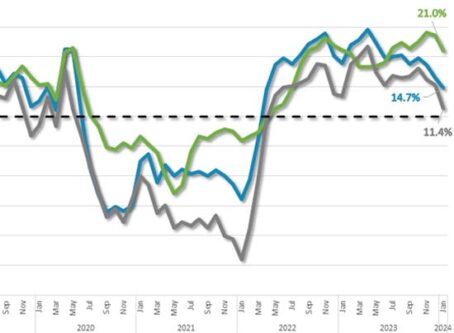OOIDA talks supply chain on ‘Glenn Beck Program’
The inefficiencies in the supply chain have nothing to do with a shortage of truck drivers.
That was the Owner-Operator Independent Drivers Association’s message during a segment of the Glenn Beck Program on Monday, Oct. 25. OOIDA Executive Vice President Lewie Pugh used the national podcast to talk about excessive wait times and a high turnover rate caused by low wages and difficult working conditions.
“First and foremost, there is no national shortage of truck drivers … That’s false,” Pugh told Beck. “There’s a turnover problem in trucking. There’s a retention problem in trucking, but there is no driver shortage.
“We have a broken, inefficient system. And with all of the shortages with COVID and everything, it’s finally been brought to light.”
Supply chain disruptions have been a hot topic recently. Earlier this month, the White House announced a plan to move toward 24/7 operations at the ports of Los Angeles and Long Beach. In addition, several large companies announced plans to expand hours to get more cargo moving. OOIDA quickly responded to the plan, saying that moving to a 24/7 model won’t fix many of the problems that truckers face.
“Most of what we are seeing is not a surprise to our members, who have been plagued with dysfunction in the supply chain for decades, and it’s not realistic to expect the supply chain will suddenly operate efficiently on a 24/7 schedule when drivers aren’t being fully paid for their time,” OOIDA President Todd Spencer said on Oct. 13.
Pugh, who was a truck driver for more than 20 years before coming to work at OOIDA headquarters, told Beck that there is no incentive for shippers and receivers to get trucks loaded or unloaded quickly because truck drivers are not paid for the time they are sitting.
“They don’t get paid well,” Pugh said. “Their time isn’t worth anything to anybody. The supply chain and the loading and unloading is so inefficient. They get mileage pay, so when they’re sitting in these long lines at the ports or big box stores or warehouses, they’re not getting paid for any of that.”
OOIDA says that truck drivers should be compensated for all of their time and has called for the repeal of the truck driver overtime exemption in the Fair Labor Standards Act.
Adding more trucks will not solve the problem, Pugh said.
“There will just be longer lines of trucks. The problem isn’t the trucks. The trucks are there. You see them on TV. You see them sitting in line. The problem is the inefficiency of loading the trucks and unloading the trucks.”
Pugh provided an example of a truck driver he knows who was fined by a big box store for showing up early to deliver a load of produce.
“He showed up early, and that box store tried to give him a $250 fine,” he said. “That’s how crazy this industry has gotten.”
Instead of focusing on plans to use the National Guard to move cargo or lowering the interstate truck driving age to 18, OOIDA said the goal should be to make truck driving a more enticing long-term career. Turnover rates at large fleets are typically more than 90%.
“I’ve sat around in Ohio waiting longer to unload steel than the 10-hour drive it took me to get there from New York,” Pugh said. “And you get paid nothing for that. You wonder why people are leaving the industry? If trucking salaries kept up with inflation since the 1970s, truckers would be making six figures. There are very few truckers out there making six figures.” LL









